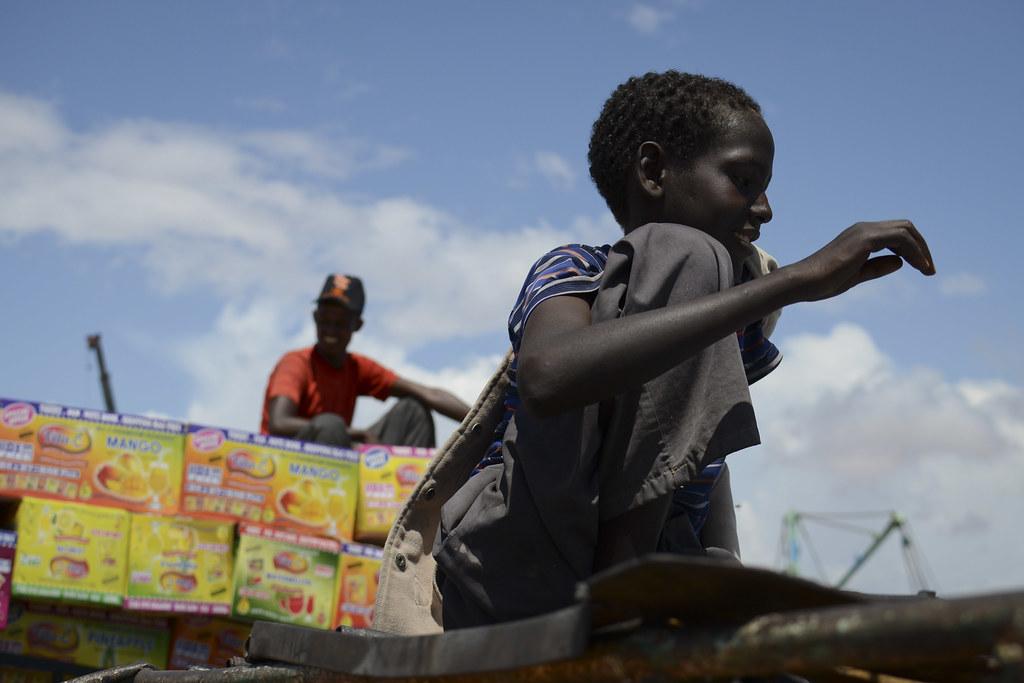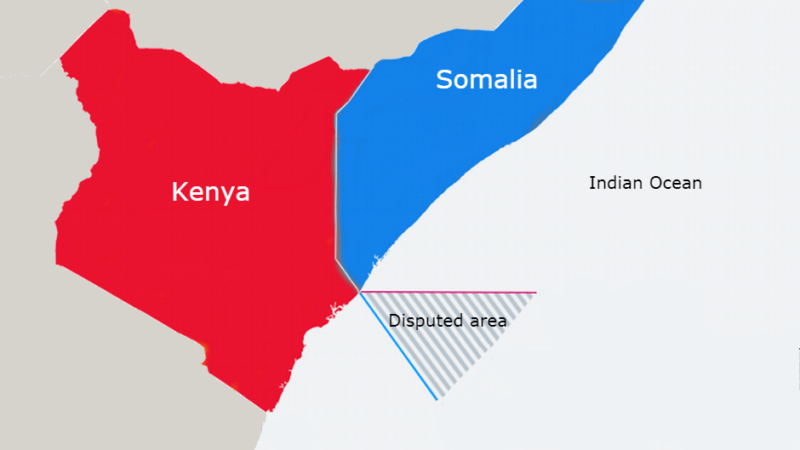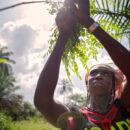Kenya and Somalia’s maritime dispute: One winner, two losers?

The ICJ hearing comes with high risks for both sides. Its postponement offers the interdependent neighbours another chance to talk.

Troops from Kenya have been crucial in helping liberate towns from al-Shabaab control in Somalia. Credit: AU-UN/ Tobin Jones.
If and when Kenya and Somalia’s maritime dispute is heard by the International Court of Justice (ICJ) next year, one aspect of the two neighbours’ long-running quarrel will finally conclude. It will be decided once and for all which country rightfully controls the small but resource-rich section of the sea being contested.
However, even if we reach a ruling, it will not mark the end of the story. And, instead of settling the issue, the verdict could lead to a further deterioration in relations. Rather than there being a winner and a loser from the process, both Kenya and Somalia could end up as losers.
The area under dispute is approximately 100,000 square kilometres and is thought to contain large deposits of oil and gas. Both countries claim the area as theirs, Kenya arguing the sea border should be drawn parallel to the line of latitude, Somalia saying it should extend in the same direction as its land border.
This fundamental disagreement led Somalia, in 2014, to call on the ICJ in The Hague to resolve the dispute. The hearing has now been set for June 2020.
Kenya has tried to convince Somalia to drop the case and settle the matter outside of court. It sees the dispute as an existential threat that is about more than potential oil and gas deposits but its access to the Indian Ocean.
Somalia has resisted this pressure. As the weaker party and with fewer regional backers, it believes its best interests lie in the international legal system. Encouraged by nationalist sentiment in the country and the diaspora, it has stuck to this strategy.
This disagreement has led to growing tensions. Many are concerned about what might happen following the ICJ ruling. While the court’s decision is final and binding under international law, it cannot enforce it. ICJ rulings have been ignored in the past and there is no guarantee both parties will accept it.
After all, the issue has already become hugely politically charged and treated as a matter of national integrity. This August, Kenyan parliamentarians called on President Uhuru Kenyatta to consider sending troops to the maritime border to protect the “sovereignty and territorial integrity of the Republic”. Somali lawmakers suggested they would be prepared to respond in kind.

Risks on both sides
In recent months, the two neighbours have come to see each other as adversaries, but this should not be the case. Kenya and Somalia have far more to cooperate on than feud over. They are deeply intertwined and interdependent. For instance, Kenya is a major troop contributor to the African Union Mission in Somalia (AMISOM) which has been crucial in containing al-Shabaab, a threat that affects both countries. Moreover, Kenya has a hugely significant Somali population and, since the Somali state collapsed in 1991, has hosted hundreds of thousands of its neighbours.
In the long-term, Kenya and Somalia both need each other much more than they need the contested triangle of maritime territory. Furthermore, whichever way the ICJ rules, the two parties would need to sit down and talk. The ruling will not end the dispute, but simply mark the start of its next chapter.
Negotiating is not only necessary but would be in both countries’ interests. In fact, the main party that would gain from the lack of talks and a deterioration in relations would be the Islamist militant group al-Shabaab. If Kenya were to pull back its 4,000 troops from Somalia, AMISOM’s capabilities would be severely weakened. Meanwhile, al-Shabaab has already been using the dispute with Kenya as a recruitment tool. In September, its leader Ahmed Diriye issued an audio message condemning Kenya’s maritime claims and other forms of foreign “invasion”.
Since Somalia took the case to the ICJ in 2014, the two parties have failed to settle their maritime dispute through bilateral talks. The recent delay in the hearing from its scheduled date in November to June next year offers another window of opportunity for both sides to engage in good faith talks rather than resorting to diplomatic pressure and heightening tensions.
In the absence of this, an eventual international ruling would break the impasse, but with high risks for both sides. A verdict in favour of Somalia could, among other things, push Kenya to contest its southern sea border with Tanzania, leading to a destabilising domino effect of disputes down to Mozambique, Madagascar and South Africa. A verdict in favour of Kenya could damage a fragile Somali state and embolden al-Shabaab which has already said it “will never accept, and are against any decision made by the so-called International Criminal Court”.
Worse still, both possible win-or-lose verdicts risk exacerbating tensions between Somalia and Kenya, which would be bad for both sides. If this happens, one party may win, but both will lose.







This is bulshit analysis
We will conquer Kenya in 1 week
Mohamed, you have a very simplistic way of thinking. The researcher has done a very good analysis of the dispute on the effects on both countries. It is true, there are no winners on this issue, and the domino effect could bring more harm than good.
You cant conquer Kenya, you should first conquer your mind, and thereafter try stabilise your country which is a ruin. That should be your first priority.
Somalia is emerging both economically and security wise . Kenya is sinking. The most corrupt country in the world is not Somalia any more, it is, it was and it will remain kenya. Kenya is much weaker than Somalia in terms of defence motivation. Somalia‘s problem is Alshabab. and once they are defeated and the arms embargo is lifted, kenya has no chance against Somalia. The Ruins of Somali will be History, but kenya will remain forever a weak nation.p
One key thing that you are all forgetting is that even though Kenya may say it is fighting Al shabab it does so because of the financial gain. Kenya is paid to supply a set number of soldier’s to Somali so pretending that it does this out of goodwill should be something that both the Kenyan authorities and its people need to accept. I would also add the following if someone comes to your door with evil intentions be it as simple as taking your hard earned money you would retaliate but on this occasion Kenya is trying to take what many Somalian people believe to be the one thing that would indeed bring stability thus bring jobs and a way of life for a country that has been torn apart by civil unrest for many years. I whole heartedly believe that if Kenya was to try to take this using what it referred to as its mighty army this would indeed bring the war into it’s own back yard. I hope that they make sure that they strongly reconsider their opinions before making a grave mistake by trying to rob us of our God given natural resources.
Well, what I know both nations need each- other and whatever happens they should cooperate and respect each nation’s integrity.
Suugaye you kind of remind of the old British colonial way of “we discovered it” as you are saying something that actually makes no sense. Somalia did not under some delusion try to take a key part of Kenya but its rather the Kenyan authorities that are trying their utmost best to not only take part of a sovereign nation but have gone as far as threatening Somalia with its army “we will send the Kenyan troops to provide and protect our nation integrity” as stated by the ministry of defence. So I believe that you are either a kenyan or you just are not able to call a thief a thief! But either way you are so far from seeing the bigger picture or simply you have put a blindfold on and will only see what you think is correct.
interesting issue, I am thinking about how the ICJ ruling will be enforced and whether both countries will accept it? that is the point. if they don’t enforce it and the international legal system has no enforcement sanctions accept political pressure so what is the outcome ‘fighting between Somalia and Kenya’ totally I don’t agree that.
let the people of the two countries who are educated and well understanding think about solutions. I am sure there is wrong let us tell the truth there is no loser- loser or win-win, if the case is ignored I am sure some innocent persons will be hurt in east Africa and development and political situation will be damaged
.
The ICJ should be neutral when delivering the Kenya/Somali verdict, why is it that president Famajo of somalia appears very stubborn to listen to local solution? What does he knows? Can the court ignore the 1979 and 2095 Kenya presidential degree proclamation?
cialis without a doctor prescription https://cialiswithdapoxetine.com/
cialis price cialis online
cialis 20mg cialis price